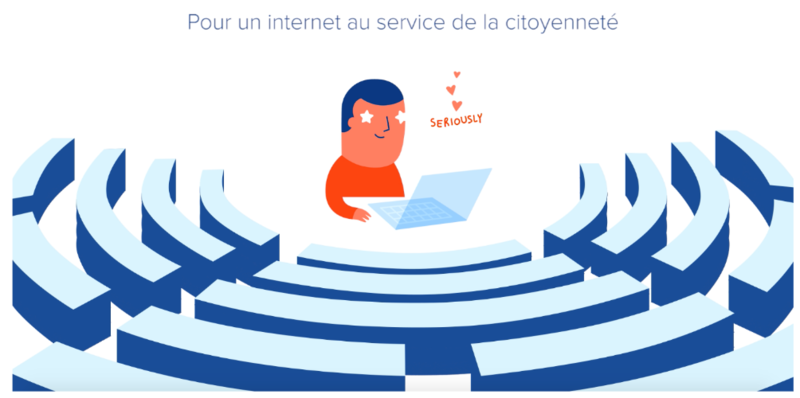News 30 September 2021
Seriously

The origin of the project
Launched by Renaissance Numérique in the aftermath of the January 2015 attacks in France, the Seriously project aims to contain the hateful dynamics that prosper in our society, especially on the Internet.
Seriously is based on the premise that in order to deal with online hate, legislative provisions and reporting tools – the main levers of action available to Internet users – are not enough. Indeed, many hateful comments are located in a “grey zone”, i.e. on the border of legality, difficult to detect with these tools. Seriously aims to equip citizens with a tool – the seriously.ong online platform – and a complementary method. This mechanism is presented in a note that deciphers the contours of this complex phenomenon, which has become a major societal problem: “Taking action against hate on the Internet in a collaborative society” (July 2017).Seriously has been showcased in multiple international governance fora (Internet Governance Forum, Paris Peace Forum). In its 2017 report “Countering Violent Extremism and Radicalisation that Lead to Terrorism: Ideas, Recommendations, and Good Practices from the OSCE Region”, the Organisation for Security and Co-operation in Europe (OSCE) promoted it among good practices against hate speech deployed across the world.
An unprecedented collaborative effort
The Seriously project is the fruit of an unprecedented collaborative effort, which brought together a diverse set of actors, at the national and international level: actors from the world of advocacy and education, the world of research and institutions, and digital platforms. This project materialised through joint actions, starting out from co-conception workshops for the tool and leading up to the constitution of a governance system for it.
The following actors supported the conception and/or development of the project:
AFPI; AFVT; Romain Badouard, Lecturer in Information and Communication Sciences at Université Paris 2 Panthéon-Assas; Susan Benesch, Director of the Dangerous Speech Project; Catherine Blaya, Professor of Education at Université Nice Sophia-Antipolis; CIPDR; Coexister; Council of Europe; DILCRAH; Maxime Drouet, Lecturer at Université Gustave Eiffel; Association e-Enfance; Facebook; Fonds pour le 11 janvier; Google; Marc Hecker, Director of Research at IFRI; Hoaxbuster; Léo Laugier, PhD student at the Institut Polytechnique de Paris; No Hate Speech Movement; Respect Zone; SOS Homophobie; SOS Racisme; Spintank; Twitter; Emmanuel Taïeb, Professor of Political Science at Science Po Lyon; UNESCO.
Former members of the governance system include:
- Jérôme Adam, Producer, J’en Crois Pas Mes Yeux;
- Justine Atlan, Director General, Association e-Enfance;
- Romain Badouard, Lecturer in Information and Communication Sciences, Université Paris 2 Panthéon-Assas;
- Catherine Blaya, Professor of Education, Université Nice Sophia-Antipolis;
- Pauline Birolini, Head of the Legal Division, SOS Racisme;
- Guillaume Buffet, President, U Change;
- Andréa Cairola, Program Specialist at the Division for Freedom of Expression, Democracy and Peace, UNESCO;
- Maxime Drouet, Lecturer, Université Gustave Eiffel;
- Jérémy Falédam, Co-president, SOS Homophobie;
- Marc Hecker, Director of Research, Institut Français des Relations Internationales;
- Léo Laugier, PhD student, Institut Polytechnique de Paris;
- Philippe Potentini, Head of Communications, Council of Europe;
- Emmanuel Taïeb, Professor of Political Science, Science Po Lyon;
- Nicolas Vanbremeersch, President, Spintank.
A tool and a method online
The Seriously project consists of a digital platform (seriously.ong) and a method to support and guide citizens, both of which allow for the pacifying of online exchanges through argumentation. This way, Seriously offers the chance to transform hate speech through discursive efforts, leading to the de-escalation of invectives and the awakening of critical thinking.
This method relies on a tool that offers concrete arguments and different behavioural approaches (rational, neutral, humorous), through an intuitive user path on the platform built around three stages:
- Factual elements (data, graphs, key figures, etc.) to frame the debate;
- Guidance by experts on the emotional and psychological dimensions, so as to adopt a good attitude and rationalise the debate;
- Media resources adapted to digital devices (videos, images, studies, etc.), to illustrate the argumentation.

A project now led by the CEMÉA
After four years of project incubation within the think tank, Renaissance Numérique decided to transfer the platform to the CEMÉA (Centres d’entraînement aux méthodes d’éducation active), a movement advocating for a new and popular approach to education. It is now a question of putting this tool at the service of the educational field and making it a tangible lever for education in digital citizenship and online debate.
The CEMÉA are deeply involved in the issue of education vis-a-vis the civic use of media and digital technologies, particularly when young people are concerned. The challenge is to integrate the Seriously platform into the training of educators, animators, teachers and any trainer working with young people, but also directly into workshops and digital education courses. Learn more about the CEMÉA project.
Renaissance Numérique will remain involved in the future of the Seriously platform and will support the CEMÉA so that they can make the most of the tool.
-

Publication 3 July 2020
Moderating our (dis)content: renewing the regulatory approach
